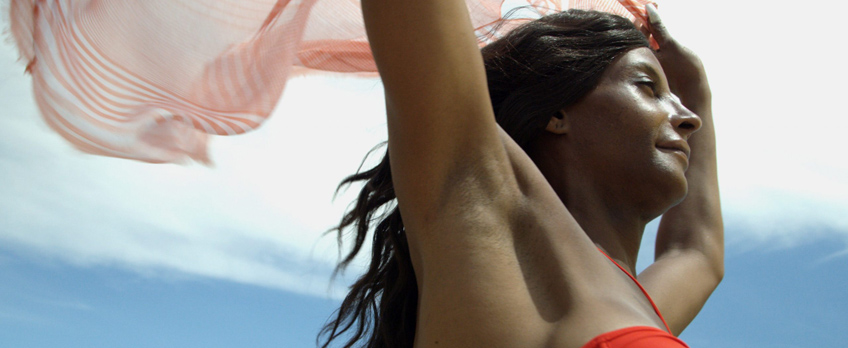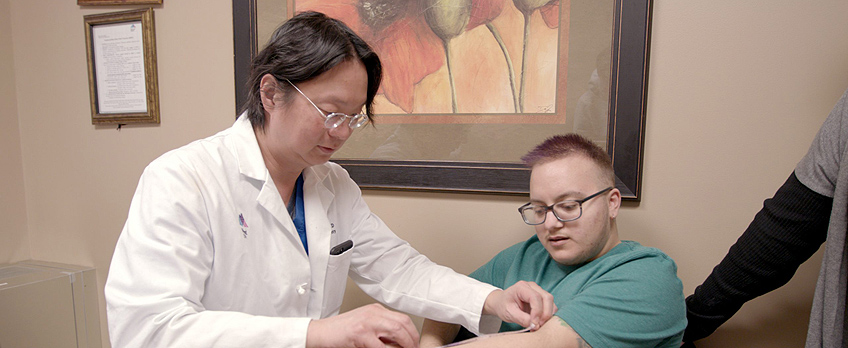The Necessity of Change: An Interview with Tania Cypriano

By Merryana Salem
Advocating against insidious politics in healthcare for vulnerable communities is a theme across Tania Cypriano’s filmography, one that goes back to her early documentary on Brazil’s first AIDS patient, Odô Yá! Vida com Aids (1997). In her latest film, Born to Be, Cypriano empathetically documents the work of Dr Jess Ting, along with a handful of his patients, at the groundbreaking Mount Sinai Center for Transgender Medicine and Surgery.
Even in the context of a casual WhatsApp conversation, Cypriano’s investment in healthcare is palpable. It’s one she’s carried her whole life: “I had an experience when I was 10,” she says. “I was in a fire accident and spent nine months in hospital. I’m very comfortable being around hospitals and talking about health because it has been a big part of my life. Not only healthcare but health campaigns have become something we in our society have to fight for, and I look at it as a human right.”
This grounding in health connected her personally to the subject of transgender healthcare, despite not being trans herself. “I’d have never taken the role of directing this film if I didn’t have the background I have,” she explains, “and my lifelong commitment to helping advocate for healthcare to underserved communities.”
For Cypriano, allyship involves an ongoing process of learning. While making Born to Be, she experienced a big awakening in terms of her understanding of conflicting expectations versus the reality of gender-affirmation surgeries. “Many think [the surgeries] will cure trauma or depression,” she sighs. “But there are still a lot of things that will trigger gender dysphoria after the surgeries, and when those experiences come, it’s a painful place.”
Cypriano refers to Devin, a woman in her 20s who, later in the documentary, attempts suicide after realising her surgery hasn’t stopped men standing her up for being trans. “That’s where I think it’s important to have some sort of mental support group to go alongside,” the filmmaker says.
Cypriano hopes that both the trans community and wider society will come away from the film recognising the need for a more holistic approach to transgender health. “That is the message of the film,” she says. “The change comes from surgery, but change also needs to come from our society.”

Born to Be
Of course, there are also patients who do not experience such extreme dissonance, and Cypriano acknowledges that she could never represent the entire breadth of trans experiences. “It’s such a complex and diverse community,” she says, “but I was looking for characters who would be able to bring something different.” Picking the group of patients at the documentary’s heart, according to Cypriano, was an organic process of hearing their stories and watching them unfold. The filmmaker also emphasises the importance of involving trans people in production: “We brought in groups of transgender viewers to look at what we were doing to see we were going in the right direction,” she explains, adding that the team “listened, even when everyone disagreed”.
In particular, Cypriano recalls an argument over the inclusion of two trans Black women, Mahogany and Cashmere: “‘Why do we need Cashmere and Mahogany? Why do we have to have two Black women [of] the same, older age who are poor?’ That was one of the big fights I had – to keep those women,” she recounts. “But [it is important] to show diversity, even with people who are the same colour and come from a similar financial background. Especially Black trans women; it is such a diverse community.” Born to Be’s greatest strength arguably comes from Cypriano’s determination to show this diversity. The film focuses on trans people from different backgrounds – young and old; white people and people of colour; some with family support and others without – but all share a trust in Dr Ting to change their bodies and their lives for the better.
Moments of heartache and humour fold into one another in Born to Be. Cypriano presents the footage as naturally as possible, and the film’s nuanced and compassionate tone is one rarely afforded to the trans community. “Those moments,” she laughs, “those delightful moments of joy and humour – I thought it was quite important to bring [them] in, so people would not walk in and see something that was a one-sided, heavy-duty topic. If I had shown this in only a serious way, where everybody’s just afraid, it’s not the reality of what those lives are.”
Born to Be is a film for everyone; it carries messages of education, both for those who are trans and those who aren’t. “It’s a good film for that,” Cypriano says, after I tell her that I was drawn to the film because I hoped it would help inform my own allyship. Cypriano knows allyship is key for filmmakers who aren’t trans but who want to include the community in their work: “The first thing I would advise other filmmakers who are not trans is to ask themselves, Why am I telling this story?” Her next piece of advice? Consult and involve the community: “Build or hire a solid team of transgender people to work, support and guide what they are doing so they can make a responsible film.” Reflecting on the making of this film, Cypriano points to the contributions of J Winkelreid, her non-binary executive producer: “They held our hands all the way.”
Responsible and compassionate, Born to Be leaves its audience with a resoundingly simple-yet-complex message on the possibility – and necessity – of change. This change is one that, yes, as Cypriano says, comes from surgery, but more significantly, it must come from our society.